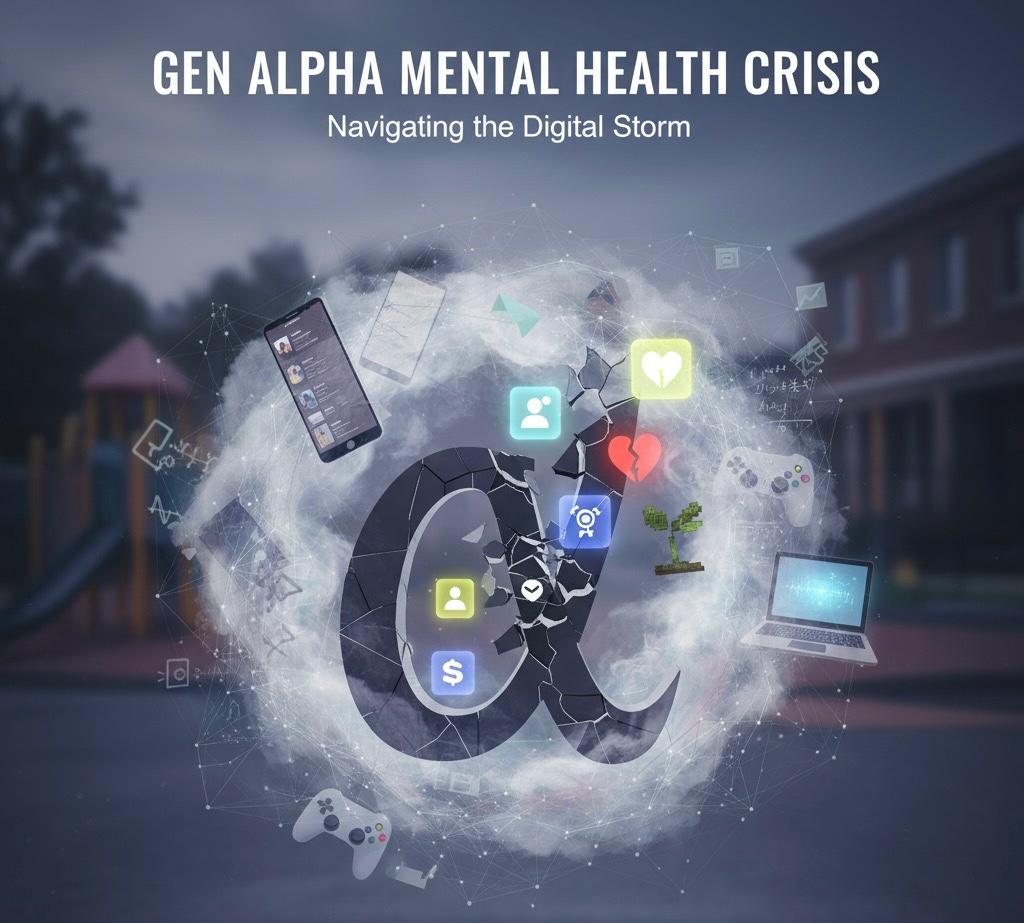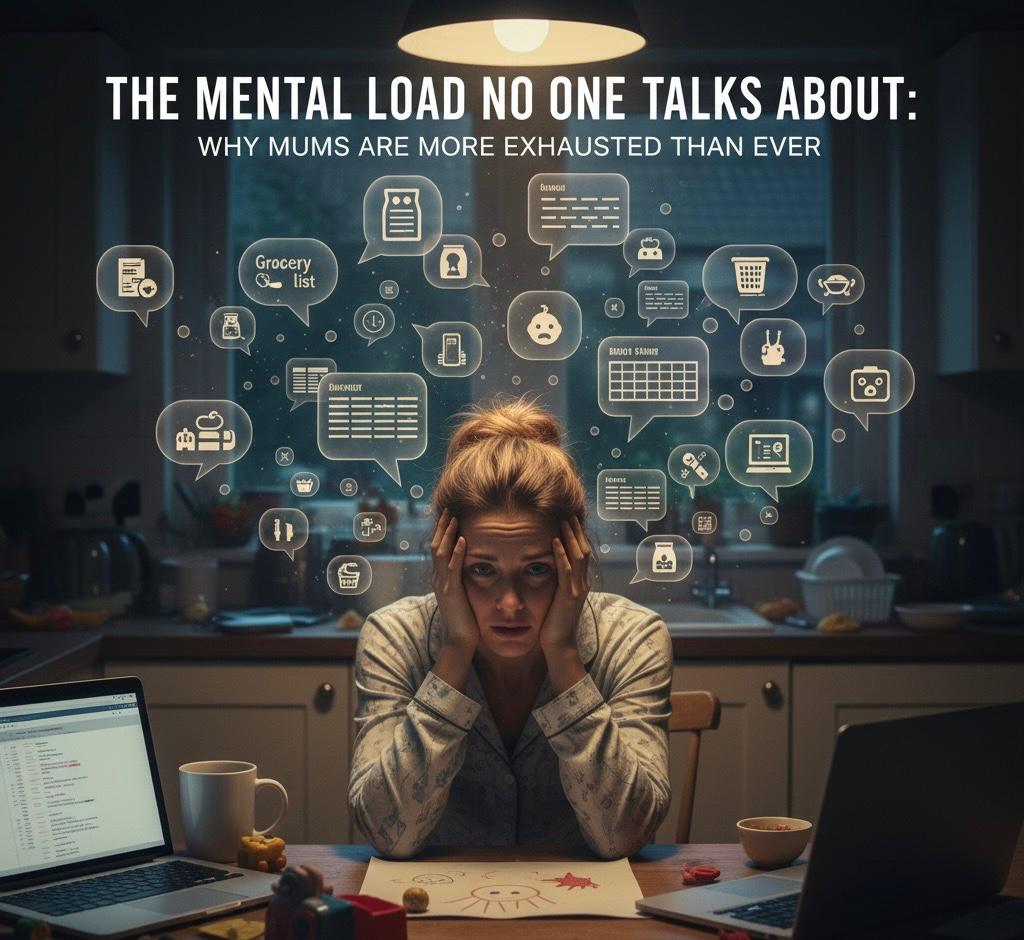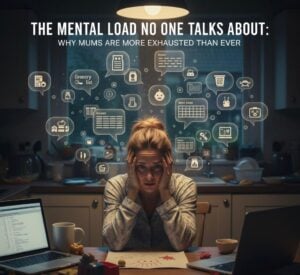Introduction
Generation Alpha — today’s children aged roughly 5 to 15 — are entering what experts now call the most mentally fragile childhood era in modern history. Paediatric psychologists and school wellbeing experts are warning of a rising Gen Alpha mental health crisis, with signs of burnout, anxiety and sensory overwhelm appearing as early as age 8–10.
In this deep dive, we explore the root causes of children’s burnout, the role of academic pressure, digital overstimulation and parenting expectations, and what families and schools must urgently change to protect long‑term emotional resilience.
Generation Alpha — children born from approximately 2010 onward — are the first to grow up entirely in an era of AI, algorithmic platforms, pandemic disruption, economic uncertainty, and unprecedented academic pressure. They are also now showing early warning signs of burnout, not in high school or university, but as young as age 8–10.
Educators, psychologists and paediatric researchers are raising urgent concerns: Are we accelerating childhood development while eliminating childhood itself? This article explores the rising mental health risks facing Gen Alpha, the mechanisms driving this crisis, and what must change to prevent a generation-wide epidemic of emotional exhaustion.
1. Who is Gen Alpha — and why are they different from Gen Z?
Gen Alpha are the children of Millennials and late Gen X, born into a world where:
- Tablets and smartphones were normal from toddlerhood
- Schooling was disrupted by COVID-19 lockdowns during key developmental years
- AI and algorithmic personalisation influence what they learn, want, and even believe
- Academic benchmarking starts earlier, with testing frameworks like NAPLAN introduced as early as Year 3 (age 8)
Unlike Gen Z — who transitioned from analog childhoods to digital adolescence — Gen Alpha never experienced pre-digital life, making their cognitive, emotional and social development fundamentally different (McCrindle, 2023).
2. The rise of early academic pressure and performance anxiety
Australian early education now involves structured academic milestones by age 5–6, compared to age 7–8 just a generation ago (OECD, 2022). While this was introduced to improve global competitiveness, the psychological cost is becoming evident.
- A 2023 study by Murdoch Children’s Research Institute found 31% of Australian primary-aged childrenexperience clinical-level anxiety symptoms, up from 13% in 2012.
- NAPLAN benchmarking and constant comparison are linked to shame-based motivation, which predicts depression, perfectionism, and disengagement (Putwain & Daly, 2014).
- Paediatric psychologists report Year 3 children already fearing academic “failure”, long before neurological maturity for self-evaluation develops (Casey, Tottenham & Fossella, 2011).
We have adultified emotional pressure — but without adult emotional capacity.
3. Digital fatigue, attention strain and algorithmic dysregulation
Gen Alpha are experiencing digital fatigue younger than any generation in history. Excessive screen exposure — especially interactive and fast-paced content — is linked to:
- Reduced emotional tolerance and dopamine dysregulation (Brand et al., 2019)
- Impaired attention and executive functioning, mirroring ADHD-like symptoms (Christakis et al., 2018)
- Sleep disruption, which directly increases anxiety and irritability (Mindell & Owens, 2015)
Algorithmic platforms reward stimulation over self-regulation, training the brain for novelty rather than resilience. The effects are neurobiological — not just behavioural.
4. Pandemic-era disruption and emotional maturity delay
Gen Alpha experienced COVID-19 not as a social inconvenience — but as a developmental interruption.
- Remote learning disrupted language, empathy and peer socialisation development (UNICEF, 2022).
- Children who missed kindergarten and early classroom conditioning show increased separation anxiety, social avoidance and self-doubt (Australian Psychological Society, 2023).
- “Year group maturity lag” is now reported globally — children are entering school year levels with chronological age but emotional age up to 1–2 years behind (BBC, 2023).
This maturity gap makes them appear “over-sensitive”, but in reality, they are simply correctly calibrated for a more unstable world.
5. Emotional burnout symptoms appearing in primary school
Increasingly, psychologists are documenting burnout-like presentations before age 12, a phenomenon previously limited to adults and university students.
Common symptoms include:
- Emotional shutdown rather than tantrums (withdrawal, numbness, refusal to try)
- Perfectionistic freeze — avoiding tasks completely rather than risking failure
- Panic before school or activities, not because of fear, but depletion
- Chronic headaches, stomach pain, sleep resistance, all linked to emotional overload (Schieman et al., 2018)
One therapist described it as: “They’re not acting like children — they’re acting like burnt-out junior executives.”
6. Are parents accidentally amplifying the crisis?
Research suggests most parental stress‑responses are well-intentioned but counterproductive.
- Hyper-scheduling and enrichment culture create time poverty and sensory overload (Lareau, 2011).
- Emotionally intensive parenting (constantly coaching and monitoring) delays self-efficacy development(Ursache et al., 2021).
- Safety obsession inhibits risk tolerance, leading to increased fear of mistakes.
The aim is protection — but the outcome is fragility under normal stress.
7. What must change — urgently
For parents
- Prioritise unstructured play and recovery time as much as academic success.
- Replace “performance check-ins” with emotional literacy conversations.
- Model tolerance for imperfection — don’t panic at small failure.
For schools
- Introduce wellbeing literacy with equal weight to academics.
- Delay high-stakes benchmarking until emotional regulation development is stable.
- Embed EAP-style supports into primary schools — not just secondary.
For governments
- Recognise Gen Alpha’s crisis as public mental health infrastructure failure.
- Prioritise safe technology design, social curriculum, and family-based early interventions — not just academic performance metrics.
Conclusion
Generation Alpha are not weaker — they are overstimulated, overmeasured, and under‑restored. We are witnessing the first children in history to experience life as a performance before developing emotional defences. If patterns continue unchanged, we may normalise burnout before high school.
But the solution is entirely possible — protect their nervous systems, not just their futures. Prioritise rest, resilience training, play and emotional safety over short‑term performance optics. A generation’s mental health depends on it.
References
- Australian Psychological Society (2023) The State of Child Mental Health Post‑Pandemic. APS.
- BBC (2023) ‘Post-pandemic maturity gap observed in primary‑age children’. BBC Education Analysis.
- Brand, M. et al. (2019) ‘The interaction of personality traits and digital consumption’, Journal of Behavioral Addictions, 8(3).
- Casey, B., Tottenham, N. & Fossella, J. (2011) ‘Development of emotional regulation’, Biological Psychiatry, 69(2).
- Christakis, D.A. et al. (2018) ‘Interactive media and cognitive development’, JAMA Pediatrics, 172(5).
- Lareau, A. (2011) Unequal Childhoods. University of California Press.
- McCrindle, M. (2023) The Gen Alpha Report: Understanding the Next Generation. McCrindle Research.
- Mindell, J.A. & Owens, J. (2015) A Clinical Guide to Pediatric Sleep. Lippincott.
- Murdoch Children’s Research Institute (2023) Anxiety Trends in Australian Children. Melbourne.
- OECD (2022) Early Childhood Education Reforms. Paris: OECD.
- Putwain, D. & Daly, A. (2014) ‘Test anxiety and academic pressure in children’, Educational Psychology Review, 26(1).
- Ruppanner, L. et al. (2021) ‘Work from home and gendered parent burnout’, Social Science Research, 100.
- Schieman, S. et al. (2018) ‘Chronic stress among parents’, Annual Review of Sociology, 44.
- UNICEF (2022) Child Development During COVID Disruption. United Nations.
- Ursache, A. et al. (2021) ‘Parental scaffolding and resilience’, Journal of Child Psychology and Psychiatry, 62(7).
- Woody, C.A. et al. (2017) ‘Prevalence of childhood anxiety and depression’, Journal of Affective Disorders, 219.







